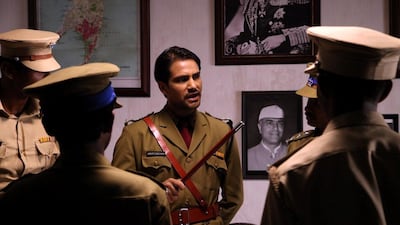The Gandhi Murder is a must-watch film for history buffs, especially for those interested in the Partition of India. After the British left the unified colony, the split triggered a disastrous civil war, leading to up to 14 million displaced and two million killed. Amid the carnage, just five-and-a-half months after Independence, Mahatma Gandhi was killed by Nathuram Godse, a right-wing fanatic, on January 30, 1948.
Even 71 years later, theories abound about the extent of the planning, and who worked with Godse as co-conspirators. The Gandhi Murder, directed by Karim Traidia and Pankaj Sehgal, outlines some unpopular points. Most importantly, the film establishes that it was a tragedy that the police could have well avoided, and that some even deliberately looked the other way.
The three law and order characters central to the story are Intelligence Bureau chief TG Sanjevi (played by Om Puri), Bombay's deputy inspector general (CID) UH Rana (Stephen Lang) and JD Nagarwala, Bombay's deputy commissioner of intelligence (Luke Pasqualino).
Ten days before Gandhi's assassination, there was a failed attempt to murder the activist by Madanlal Pahwa, and he revealed the identity of Godse and other accomplices in an interrogation with Sanjevi.
The IB chief then told Rana and Nagarwala to tie up the loose ends while trying to get India's home minister Vallabhbhai Patel to avoid Gandhi's exposure to a heightened risk of attack. The Bombay state home minister Morarji Desai also got intelligence from a parallel source and alerted Nagarwala and Patel.
What happened in the days leading up to the murder, and why the police did not prevent it, is the plot synopsis for The Gandhi Murder, produced by Nugen Media, which has headquarters in Dubai.
The film has a watertight screenplay, which is marred towards the end because the censor board removed some references to the strong possibility that the politicians involved may have been a passive ally to the assassination by avoiding warnings.
Those who have researched that evening's news reports, and the submissions to a Justice KL Kapur Commission enquiry – which investigated the murder more than two decades later, will still have questions, for which there has never been a conclusion. Through The Gandhi Murder's nuanced scripting, the film's makers imply the reasons why questions still go unanswered.
Rana and Nagarwala share a strong friendship: and Rana's intelligence gathering skills smell a conspiracy even before the Pahwa incident, and he draws a parallel from Abraham Lincoln's assassination in 1865, days after the end of America's civil war.
Lang's performance is layered, unlike the military commander role he played in Avatar. Om Puri is his usual self. But it is Pasqualino as Nagarwala who stands out as he plays the indecisive man in the middle who must do his duty, but is slowly convinced of Rana's bigger picture.
The Gandhi Murder was first named Solar Eclipse: The Dark Universe, and a climax scene to signify that unfortunately makes for a very tacky ending. The film's credits make reference to the fact that it was Nagarwala who was in charge of the murder investigation, as well as a point that Martin Luther King had joined the club of Gandhi and Lincoln as a leader who may have been killed for a perceived greater good.
It is sad the makers decided not to release the film in India after receiving death threats over perceptions of the content. The film sheds interesting light on a killing that the world would be better off to learn about, and not just those in India.


